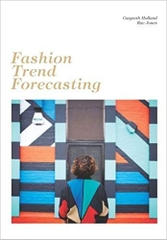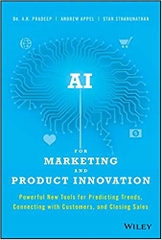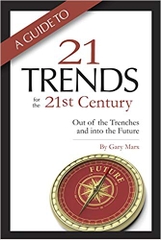-
-
-
Tổng tiền thanh toán:
-
-
Thông tin
-
Tìm sách theo yêu cầu
In 2006, co-authors Robert Scoble and Shel Israel wrote Naked Conversations, a book that persuaded businesses to embrace what we now call social media. Six years later they have teamed up again to report that social media is but one of five converging forces that promise to change virtually every aspect of our lives. You know these other forces already: mobile, data, sensors and location-based technology. Combined with social media they form a new generation of personalized technology that knows us better than our closest friends. Armed with that knowledge our personal devices can anticipate what we’ll need next and serve us better than a butler or an executive assistant. The resulting convergent superforce is so powerful that it is ushering in a era the authors call the Age of Context. In this new era, our devices know when to wake us up early because it snowed last night; they contact the people we are supposed to meet with to warn them we’re running late. They even find content worth watching on television. They also promise to cure cancer and make it harder for terrorists to do their damage. Astoundingly, in the coming age you may only receive ads you want to see. Scoble and Israel have spent more than a year researching this book. They report what they have learned from interviewing more than a hundred pioneers of the new technology and by examining hundreds of contextual products. What does it all mean? How will it change society in the future? The authors are unabashed tech enthusiasts, but as they write, an elephant sits in the living room of our book and it is called privacy. We are entering a time when our technology serves us best because it watches us; collecting data on what we do, who we speak with, what we look at. There is no doubt about it: Big Data is watching you. The time to lament the loss of privacy is over. The authors argue that the time is right to demand options that enable people to reclaim some portions of that privacy.
Product Details
- Paperback: 248 pages
- Publisher: CreateSpace Independent Publishing Platform; 1 edition (September 5, 2013)
- Language: English
- ISBN-10: 1492348430
- ISBN-13: 978-1492348436
- Product Dimensions: 0.6 x 6 x 9 inches
- Shipping Weight: 14.9 ounces (View shipping rates and policies)
- Average Customer Review: 4.6 out of 5 stars See all reviews (228 customer reviews)
- Amazon Best Sellers Rank: #43,593 in Books (See Top 100 in Books)
Editorial Reviews
About the Author
Shel Israel and Robert Scoble have been friends for several years. They have appeared in the media and on conference stages many times. Both have a passion for how technology will change the world Robert Scoble is among the world’s best-known tech journalists. In his day job as Startup Liaison for Rackspace, the Open Cloud Computing Company, Scoble travels the world looking for the latest developments on technology’s bleeding edge. He's interviewed thousands of executives and technology innovators and reports for Rackspace TV and in social media. He can be found at scobleizer.com. You can email him at Scobleizer@gmail.com, and on social networks as Robert Scoble. Shel Israel helps businesses tell their stories in engaging ways as a writer, consultant and presentation coach. He writes The Social Beat column for Forbes and has contributed editorially to BusinessWeek, Dow Jones, Fast Company and American Express Open Forum. He has been a keynote speaker more than 50 times on five continents. You can follow him at http://blogs.forbes.com/shelisrael and talk to him at shelisrael1@gmail.com or at most social networks as shelisrael.
Most Helpful Customer Reviews
81 of 94 people found the following review helpfulBy Thomas Wendt on September 29, 2013
Format: Paperback
9 Comments Was this review helpful to you? YesNoEarlier this week I picked up a copy (or rather downloaded a copy) of Robert Scoble and Shel Israel's new book The Age of Context. Given my interest in context-aware computing from a design and philosophical perspective ([...] I wanted to see what a tech pundit and business consultant had to saw about this trend. I've been following Scoble's talks and tweets on the subject for a while and always felt that while they are excellent for creating wider awareness, they lack analytical depth. Unfortunately, the same is true of this book. Instead of interrogating new technological capabilities or performing a deep analysis of potential effects on consumer culture, Scoble and Israel instead chose to rely on listing product after product while repeating the same concepts over and over.
But that's not to say the book isn't worth reading. One of the most interesting things about it is, even if perhaps not intentional, it frames the discussion of context-aware computing not around the concept of intuition, but rather of the uncanny ([...] That is, instead of relying on colloquial notions of what is "intuitive," they avoid this trap and instead refer to the function of technology that "knows you" as uncanny, which is, I think, much more accurate. There is only one instance of the uncanny reference, but even the single mention frames context-aware computing as that which is so familiar it's too familiar. Scoble and Israel later later give this the name "freaky factor," which is a bit unfortunate, but I think what they're really getting at is the sense that context-awareness creates a relationship with technology in which the system "knows too much." The "freaky factor" line is really the difference between familiarity and the hyperfamiliarity.Read more ›
But that's not to say the book isn't worth reading. One of the most interesting things about it is, even if perhaps not intentional, it frames the discussion of context-aware computing not around the concept of intuition, but rather of the uncanny ([...] That is, instead of relying on colloquial notions of what is "intuitive," they avoid this trap and instead refer to the function of technology that "knows you" as uncanny, which is, I think, much more accurate. There is only one instance of the uncanny reference, but even the single mention frames context-aware computing as that which is so familiar it's too familiar. Scoble and Israel later later give this the name "freaky factor," which is a bit unfortunate, but I think what they're really getting at is the sense that context-awareness creates a relationship with technology in which the system "knows too much." The "freaky factor" line is really the difference between familiarity and the hyperfamiliarity.Read more ›
25 of 29 people found the following review helpfulBy Robert E. Gold on October 8, 2013
Format: Kindle Edition Verified Purchase
3 Comments Was this review helpful to you? YesNoContext brings order to our awareness, relating and organizing life and work. This book is a wonderful collaboration of art and technological science. Maybe Shel might be interested in teaming up with someone in other scientific realms. His gift is as readily apparent as Robert's mastery of one of the most promising sciences to benefit humanity. The next ten years will be remarkable. Robert and Shel, thank you for this wonderful contribution.
17 of 19 people found the following review helpfulBy Jeremiah Owyang on September 14, 2013
Format: Paperback
Comment Was this review helpful to you? YesNoRobert and Shel have continued to help pave a path in the wilderness for us. Nearly 8 years ago, they co-wrote Naked Conversations on how corporations would adopt social technologies, which was a seminal and a career shaping book for me personally. They really helped to foster the ideas, lexicon, values and define how my career would be shaped. Now, they've done it again with the Age of Context, where technology seeking Robert finds, trials, breaks, and adopts new technology, and Shel discovers, chronicles, documents what it means for the world. The only challenge this book and other technology books struggle to do is to stay current. To combat, these two have a vibrant compendium of tweets, blog posts, videos and other resources you should stay subscribed to, in order to stay current. This dynamic duo is a team to watch, track, and follow, in this book, the Age of Context (I got a chance to pre-read) and others.
12 of 13 people found the following review helpfulBy Peter Kim on September 13, 2013
Format: Paperback
Comment Was this review helpful to you? YesNoThis book is a great read in which Scoble and Israel identify the core building blocks for the next major wave of global innovation -- what they call a "perfect storm of five forces." The authors talk through examples of where industries and companies have started to prove the value of emerging technologies, making it easy to connect the dots on where this could all lead. In fact, readers may want to start with the epilogue, which puts everything together.
It helps to be oriented as a technology-optimist before consuming the content. If you are skeptical about the potential of emerging technologies, you will likely not enjoy this book. However, the authors balance their discussion of potential commercial benefits along with well-reasoned legal and privacy concerns. Although they cover a great deal of industries and applications in the book, Scoble and Israel could have explored business models in more depth and a couple of chapters read like grocery lists, rushing to mention as many products as possible.
Bottom line: the timing is right for the "Age of Context" and the principles in this book will prepare readers for the next wave of global innovation.
It helps to be oriented as a technology-optimist before consuming the content. If you are skeptical about the potential of emerging technologies, you will likely not enjoy this book. However, the authors balance their discussion of potential commercial benefits along with well-reasoned legal and privacy concerns. Although they cover a great deal of industries and applications in the book, Scoble and Israel could have explored business models in more depth and a couple of chapters read like grocery lists, rushing to mention as many products as possible.
Bottom line: the timing is right for the "Age of Context" and the principles in this book will prepare readers for the next wave of global innovation.
8 of 9 people found the following review helpfulBy Tatyana Kanzaveli on September 14, 2013
Format: Paperback
Not too many books appeal to both: consumers and brands. This book "Age of Context" by Shel Israel ( @shelisrael ) and Robert Scoble ( @scobleizer ) most definitely does! It filled with so many stories, examples of the most innovative technologies used by forward thinking brands. It also explains the impact of those advanced technologies on people's lives.
The magnitude of the impact of 5 technological forces described in the book: mobile devices, social media, big data, sensors and location-based services, should not be underestimated.
Brands that are not staying abreast of the latest trends will be facing major challenges to stay relevant, provide experiences expected by their customers.
People need to be aware of new types of potential implications these exciting devices and technologies bring into their lives: privacy, security and more.
This book is a masterpiece of brilliant storytelling about geeky matters in humanly digestible way!
The magnitude of the impact of 5 technological forces described in the book: mobile devices, social media, big data, sensors and location-based services, should not be underestimated.
Brands that are not staying abreast of the latest trends will be facing major challenges to stay relevant, provide experiences expected by their customers.
People need to be aware of new types of potential implications these exciting devices and technologies bring into their lives: privacy, security and more.
This book is a masterpiece of brilliant storytelling about geeky matters in humanly digestible way!
xem thêm tại amazon.com
- Thông tin chi tiết
- Mục lục
- Đọc thử
- Đọc thử
- Đánh giá & bình luận của người mua
- Những cuốn sách cùng chủ đề hoặc có liên quan
Link: http://www.amazon.com/Age-Context-Mobile-Sensors-Privacy/dp/1492348430/
Tại web chỉ có một phần nhỏ các đầu sách đang có nên nếu cần tìm sách gì các bạn có thể liên hệ trực tiếp với Thư viện qua Mail, Zalo, Fanpage nhé
Đăng ký nhận tin qua email
Hãy đăng ký ngay hôm nay để nhận được những tin tức cập nhật mới nhất về sản phẩm và các chương trình giảm giá, khuyến mại của chúng tôi.












